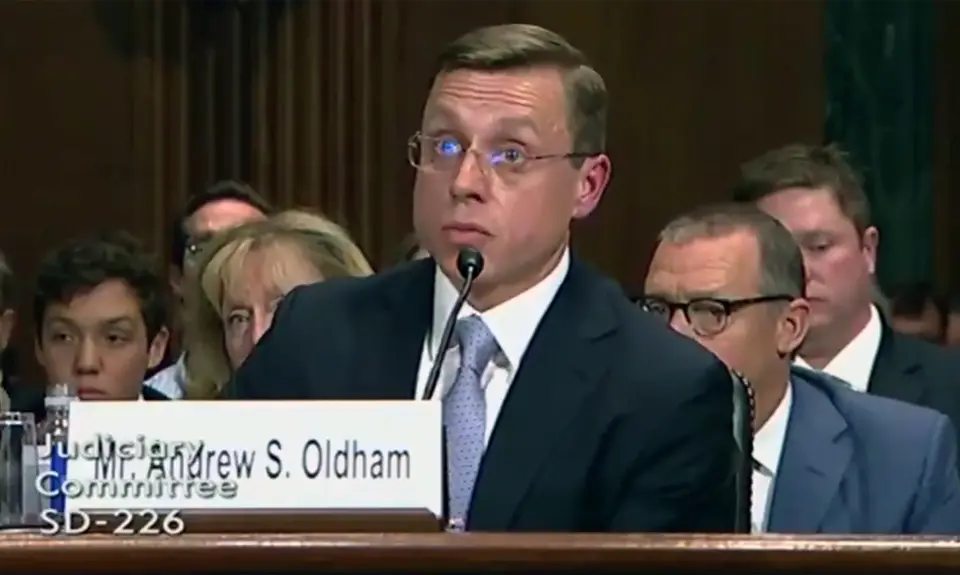“Confirmed Judges, Confirmed Fears” is a blog series documenting the harmful impact of President Trump’s judges on Americans’ rights and liberties. Cases in the series can be found by issue and by judge at this link.
Trump Fifth Circuit judge Andrew Oldham argued in dissent that the court should uphold a lower court decision that dismissed on summary judgment a Black woman’s claim that she was fired in retaliation for requesting medical leave, in violation of the federal Family and Medical Leave Act (FMLA). In an opinion by Reagan nominee Grady Jolly, the majority rejected Oldham’s argument and reversed the lower court ruling in its May 2021 decision in Watkins v Tregre.
Denise Watkins, who is African-American, had worked in the dispatch department of a Louisiana parish sheriff’s office for some 17 years, and had risen to the position of shift supervisor. At the end of January 2018, her supervisor sent an email commending “superb work” by Watkins and three others. Some three weeks later, Watkins notified her supervisors that she was suffering from an anxiety disorder and gave them a doctor’s note stating that she required three 24-hour shifts off per week.
Two days later, a supervisor filed a disciplinary review board request against Watkins, charging that she had engaged in “unsuitable” job performance. He had “counseled” her on such concerns some ten days earlier but “he neither took, nor indicated, further disciplinary action.”
The only issue the board took action on was the charge that Watkins had sometimes slept or napped on the job, which Watkins admitted and explained was attributable to the “medical issues” she had developed, and which she again requested medical leave to help address. The board nevertheless recommended on March 1 that she be fired for that offense, which the sheriff did the next day. This was despite the fact that a white shift supervisor had also been “caught” sleeping on the job, but “only received ‘counseling’” and was not fired.
Watkins filed suit against the sheriff’s office, contending that she had been discriminated against on the basis of race and had been improperly fired under FMLA in retaliation for requesting medical leave. A lower court granted summary judgment against her without a trial, and the case was appealed to the Fifth Circuit.
The three judges on the appeals court panel all agreed that Watkins should be able to present her race discrimination case to a jury. In a 2-1 decision written by Judge Grady Jolly, who was nominated by President Reagan, the majority also reversed the lower court ruling on the FMLA claim. Judge Jolly explained that Watkins had demonstrated a “genuine dispute” of facts concerning “FMLA retaliation” for requesting medical leave. The evidence in the record, Jolly continued, showed that the sheriff “tolerated” sleeping on the job on occasion, as shown by the treatment of the white shift supervisor, and the sheriff “could not recall any dispatcher” other than Watkins who had been fired for this reason. In addition, Jolly went on, the “suspicious sequence of events” as discussed above supported Watkins’ pretext claim, including the filing of the charges against Watkins “[w]ithin two days” of the request for medical leave. Overall, the majority concluded, a “reasonable jury” could decide that the alleged reason for firing Watkins was a pretext, and she should be allowed to present her FMLA claim to a jury.
Trump judge Oldham dissented on the FMLA issue. He noted that the “temporal proximity” relied on by the majority “alone” was “insufficient”, and that it was “irrelevant as a matter of law” that the other shift supervisor was not fired for sleeping on the job. Judge Jolly made clear, however, that the majority was relying on more than the “close” temporal proximity, and that Oldham was wrong in suggesting that the treatment of the other shift supervisor was irrelevant. On the contrary, the majority pointed out, it was “inescapable when applying rational thinking” that the record provided “probative” evidence of pretext, and Watkin was “entitled” to present her claim and her evidence to a jury.
Fortunately, Denise Watkins will have the opportunity to present both her discrimination claims to a jury. If it had been up to Trump judge Oldham, however, she would not have been able to proceed on her FMLA contention, and future claims of discrimination concerning FMLA could well have been more difficult to establish. This decision shows the continuing importance of our fight for or courts and the confirmation of Biden nominees.
